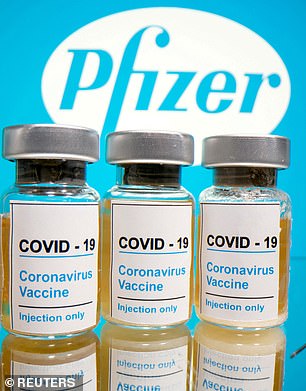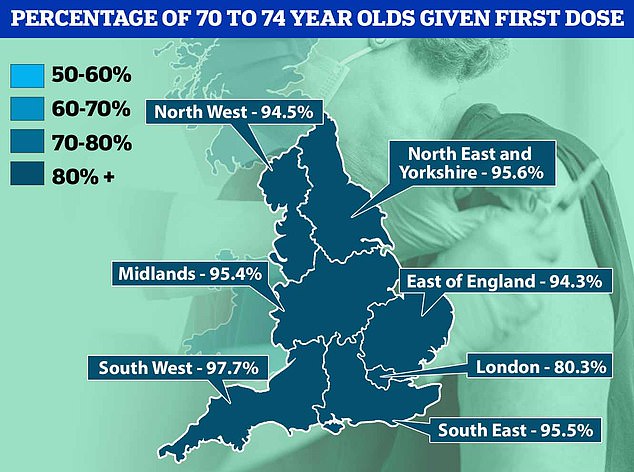
Pfizer/BioNTech’s coronavirus vaccine is 85 per cent effective after the first dose, according to an Israeli study
Pfizer/BioNTech’s coronavirus vaccine is 85 per cent effective after the first dose, according to an Israeli study that bolsters Britain’s decision to delay the second injection.
The UK drew criticism in January when it pushed back the second dose from three weeks to three months because the jabs were never trialled using that dosing regimen.
But the latest research on 9,000 healthcare workers, published in The Lancet, found that a single shot reduced the number of people developing symptomatic Covid by 85 per cent after three weeks.
Separate research by Pfizer/BioNTech published today showed their vaccine can now be stored at the same temperature as a household freezer (-15C to -25C) for two weeks rather than at the ultra-cold -70C. This could dramatically expand the rollout of the jabs, and rule out the logistical nightmare of moving doses in specialist containers keeping them at ultra-low temperatures.
The study on the effectiveness of the jabs after one dose was carried out by the Sheba Medical Centre, one of Israel’s top research hospitals. It reported a 75 per cent drop in the number of people testing positive for the infection, suggesting the single shot will have a significant impact on blocking asymptomatic infection and transmission.
A positive PCR swab would signal that even someone who is vaccinated is carrying fragments of the virus in their nose or throat which they could pass on. Reducing Covid’s spread is critical for country’s to achieve ‘herd immunity’, when so many people are immune that a disease peters out.
Lead researcher Professor Arnon Afek, deputy director-general at Sheba, said: ‘This groundbreaking research supports the British government’s decision to begin inoculating its citizens with a single dose of the vaccine.’
The UK has also been spacing out Oxford University’s vaccine doses in a bid to get better coverage quicker, with the nation in a race against time to vaccinate as many vulnerable Britons as possible before the end of March.
An Oxford study earlier this month found a single shot of that jab was 76 per cent effective for 12 weeks at stopping symptomatic disease and blocks seven in 10 people from spreading it.

Pfizer/BioNTech vaccine CAN be stored at same temperature as household freezer results show
The Pfizer/BioNTech vaccine can be stored at the same temperature as a household freezer, results show, in a dramatic change bound to speed up the rollout.
The pharmaceutical companies have submitted their study to the US-based Food and Drug Administration (FDA) for approval, reports the Financial Times. It is not clear if the results have been submitted to the UK regulators.
Stability data shows the shots store just as well when kept at normal freezer temperatures (-15C to -25C) as they do when at ultra-cold levels (-60C to -80C).
Current requirements say they must be kept at the ultra-cold temperatures, which has led to countries building specialist supply chains using dry ice to distribute the jabs.
But allowing them to be moved at warmer temperatures means industrial freezers can now accommodate them, and opens the door to a faster rollout in third world countries.
The jabs will still need to be defrosted before they are used.
Professor Peter English, an infectious diseases expert, said he thought it was likely the companies had been unable to test their jab being stored at different temperatures before it was distributed.
‘My guess would be that they store the product that way (ultra-cold temperatures) in their research facilities, and had not been able to do the necessary testing in time, prior to release as soon as possible so the product could be used, to ensure that lower temperature storage would suffice.’
Advertisement
Sheba epidemiologist Gili Regev-Yochay cautioned that the cohort studied at the hospital were ‘mostly young and healthy’.
Unlike with Pfizer’s clinical trial, ‘we don’t have many (staff) here aged over 65,’ she told reporters.
But she also noted that the Sheba study took place during a surge in Covid-19 infections in Israel, which flooded hospitals with new cases.
Pfizer declined to comment on the data, saying in a statement it was doing its own analysis of ‘the vaccine´s real-world effectiveness in several locations worldwide, including Israel’.
It hopes to use Israeli data to look at the potential of the vaccine to protect against Covid-19 arising from emerging variants, the drugmaker said.
Pfizer’s original trial of the vaccine found efficacy was 95 per cent if two doses were given 21 days apart.
Other countries including Israel and the US are trying to stick more closely to the three-week gap proven in the clinical trial.
It comes after England’s Covid vaccine postcode lottery was laid bare last night.
It emerged parts of London have jabbed just 60 per cent of over-70s – while almost every elderly person has had their first dose in one district in Hampshire.
The NHS England statistics, which go up to February 14, also show that some parts of the country have dished out nearly 300 times as many second doses as others.
The capital was hardest hit by the lottery overall, accounting for the worst 10 areas for uptake.
Bottom of the pile was Westminster, in the city centre, where only 60.9 per cent of residents over 70 have had their first injection. West London was second, where 67.5 per cent in the same age group have been jabbed.
On the other hand, North East Hampshire and Farnham which had got 99.8 per cent of its over-70s their first doses, the highest level in the country.
East Leicestershire and Rutland was second, at 99.3 per cent. Somerset and Sunderland have both also jabbed more than 99 per cent of over-70s with either Pfizer’s or Oxford’s vaccine.
Health chiefs fear vaccine hesitancy among black, Asian and ethnic minority (BAME) groups is behind the poorer uptake in London’s culturally diverse boroughs. It follows reports of GP surgeries in London having to close early because not enough people have been turning up to get their injection.
The figures do not take into account health and social care staff or extremely clinically vulnerable younger people, such as those with terminal illnesses, who are both also at the top of the vaccine priority list. Instead, they look solely at over-70s, who are most at risk of dying from the illness.
Britain has already vaccinated more than 16million people and ministers have pledged to dish out jabs to all 32million in the top nine groups by April.
With the Government taking a cautious approach to easing lockdown this time around, it is widely accepted that all of the nine top vulnerable groups will need to have had at least one dose of vaccine before curbs can be significantly eased.
Vaccines are ‘doing the job’ to cut Covid cases, experts say
Vaccines are ‘doing the job’ when it comes to cutting the number of people infected with Covid-19, a top scientific adviser has said.
Professor Adam Finn, from the University of Bristol and a member of the Joint Committee on Vaccination and Immunisation (JCVI), said ‘everything’s moving in the right direction’ when it comes to the impact of vaccines on the pandemic.
His comments were echoed by Professor Neil Ferguson, from Imperial College London and a key figure in ensuring the UK went into lockdown last March, who said that while it was still ‘early days’, a figure of two-thirds efficacy from a single dose of a vaccine was ‘not too far off’.
Public Health England (PHE) is due to publish data shortly which shows the effectiveness of the current vaccination programme.
Prof Finn told BBC Radio 4’s Today programme: ‘We’ve now got to the point with the study we’re doing in Bristol where we can say with certainty that there is definitely an effect.
‘It’s just hard to put an exact number on it at this point because… the numbers of cases coming through are still building up, the number of people who’ve been vaccinated are still going up, but it’s becoming clearer for the Pfizer vaccine, which we’ve been using for a month longer, since early December, and it’ll take slightly longer for us to get a firm handle on just how well the AstraZeneca vaccine is preventing hospitalisations too, but they’re definitely doing the job.’
Prof Ferguson said data on vaccine effectiveness and how quickly infection, deaths and hospital cases were declining across the country was looking promising.
But he added: ‘The trade-off we have is between how quickly can we relax, and how quickly we can immunise and protect the population.
‘And there’s still risks at the moment in relaxing too quickly when we don’t have enough immunity in the population bearing in mind that no vaccine is a panacea, no vaccine will offer perfect protection.’
Prof Ferguson told BBC Radio 4’s Today programme that he thought the current lockdown should be lifted in stages, adding that the ‘downside of taking bigger risks is you risk having to lock down again which is even more disruptive economically and socially’.
He added: ‘I am encouraged by the cautious approach being taken, an incremental approach which I think will be adopted, namely relax one thing and see what the impact is, relax again.
‘And it still may well be that by the end of May, we’re in a very different country than we are today.’
He said this meant rules would still be in place ‘but I think society will be a lot more normal’, adding that it did depend on things panning out as hoped.
Advertisement
Source link : https://www.dailymail.co.uk/news/article-9276973/Israeli-study-finds-Pfizer-vaccine-85-effective-shot.html











